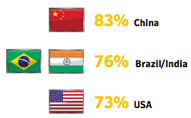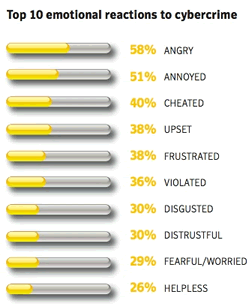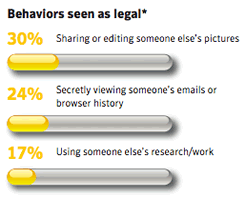The Norton Cybercrime Report: The Human Impact – Report Gauges Emotional Impact of Cybercrime, Shows 65% of Internet Users a Victim of Cybercrime
Cybercrime is real, it’s big, and it’s affecting a huge portion of the global Internet population.
A new study released today from security software vendor Norton (Symantec) reveals the astonishing prevalence of cybercrime globally and the emotional impact it has on people.
“The Norton Cybercrime Report: The Human Impact,” showed that two-thirds (65 percent) of Internet users globally, and almost three-quarters (73 percent) of U.S. users have been a victim of cybercrime.

Which countries have the highest rates of cybercrime? China wins with (83 percent) followed by Brazil and India (tie at 76 percent) and America ranking third on the list of most victimized countries. Less than one in 10 people (9%) who responded said they feel ‘very’ safe online.
The report set the classification of cybercrime to include computer viruses/malware; online credit card fraud; online hacking; online harassment; online identity theft; online scams; online sexual predation and phishing. That’s a fairly broad scope but all can be considered crimes in one way or other with some obviously more serious than others.
 The report, the first large-scale study to examine the emotional impact of cybercrime, shows that victims’ strongest reactions are feeling angry (58 percent), annoyed (51 percent) and cheated (40 percent), and in many cases, they blame themselves for being attacked. Many believe that ‘faceless’ criminals are the main perpetrators of cybercrime and nearly 80 percent of users surveyed don’t expect cybercriminals to be brought to justice. As a result, many victims fail to take action as far as reporting and working to remedy the damage done.
The report, the first large-scale study to examine the emotional impact of cybercrime, shows that victims’ strongest reactions are feeling angry (58 percent), annoyed (51 percent) and cheated (40 percent), and in many cases, they blame themselves for being attacked. Many believe that ‘faceless’ criminals are the main perpetrators of cybercrime and nearly 80 percent of users surveyed don’t expect cybercriminals to be brought to justice. As a result, many victims fail to take action as far as reporting and working to remedy the damage done.
Adam Palmer, Norton Lead Cyber Security Advisor, believes these figures tell a mixed tale. “Many criminals reside in a foreign country so it’s no surprise that people regard them as ‘faceless’ – they physically are. And because international cybercrime is hard to uncover and prosecute, people genuinely aren’t seeing justice being done,” said Palmer.
Less than half (44 percent) of all cybercrime victims call their financial institution or the police and just over a third contact the website owner or email provider.
In the UK and USA people are more likely to call their bank or financial institution (63% and 59% respectively). While in Sweden and Japan, victims are more likely to call the police (74% and 52%).
According to associate professor of psychology at Loyola Marymount University, Joseph LaBrie PhD, “We accept cybercrime because of a learned helplessness. It’s like getting ripped off at a garage – if you don‘t know enough about cars, you don‘t argue with the mechanic. People just accept a situation, even if it feels bad.”
Solving cybercrime can be highly frustrating and time consuming, often leading to no helpful result. According to the study, the time to resolve a cybercrime is 28 days with an average cost to resolve the crime being $334.
While reporting a cybercrime may be a hassle, reporting cybercrime is critical. “We all pay for cybercrime, either directly or through pass-along costs from our financial institutions,” said Palmer. “Cybercriminals purposely steal small amounts to remain undetected, but all of these add up. If you fail to report a loss, you may actually be helping the criminal stay under the radar.”

The “human impact” aspect of the report goes into the little crimes or white lies consumers perpetrate against friends, family, loved ones and businesses. Nearly half of respondents say it’s ok and “legal” to download a single music track, album or movie without paying. Additionally, twenty-four percent think it’s perfectly okay to secretly view someone else’s e-mails or browser history. Clear your history and lock your workstations folks!
Details and methodology behind The Norton Cybercrime Report
The survey was conducted online among 7,066 adults aged 18 and over. It was conducted in the primary language of 14 countries (Australia, Brazil, Canada, China, France, Germany, India, Italy, Japan, New Zealand, Spain, Sweden, United Kingdom, and United States).
The full Norton Cybercrime Report: The Human Impact can be downloaded here.















